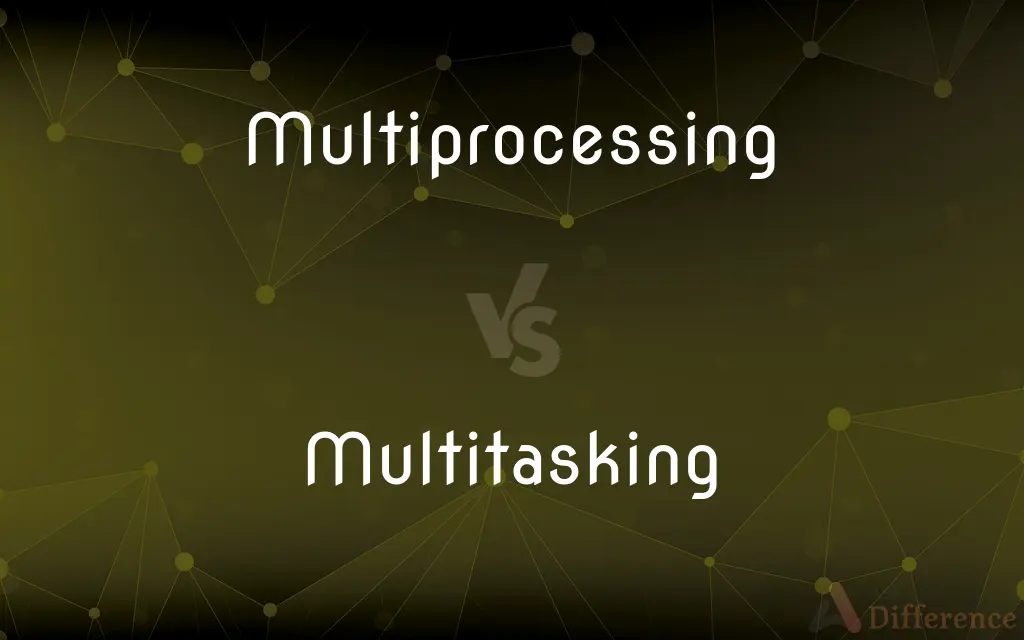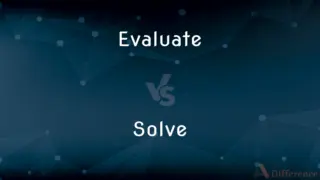Multiprocessing vs. Multitasking — What's the Difference?
By Maham Liaqat & Urooj Arif — Updated on March 20, 2024
Multiprocessing involves multiple CPUs or cores executing tasks simultaneously, enhancing performance and efficiency in computing systems. Multitasking, however, refers to a system's ability to manage and execute multiple tasks at once.

Difference Between Multiprocessing and Multitasking
Table of Contents
ADVERTISEMENT
Key Differences
Multiprocessing leverages the power of more than one CPU or multiple core processors to perform several tasks or parts of a task concurrently. This approach significantly boosts computational speed and efficiency, especially for complex or resource-intensive processes. In contrast, multitasking enables an operating system (OS) to handle multiple tasks by swiftly switching between them, so users experience the tasks as being performed simultaneously. While multiprocessing is a hardware-based strategy to increase performance, multitasking is a software-based approach to optimize the utilization of the CPU.
In multiprocessing systems, tasks are divided and processed in parallel, reducing the time required for processes to complete. This is particularly advantageous for applications that can be broken down into smaller, independent tasks. Meanwhile, multitasking involves the operating system's scheduler dividing CPU time among multiple tasks, which can include both user applications and system processes. The goal of multitasking is to ensure that the computer system is responsive to user input and that tasks are completed in an efficient manner, without wasting CPU cycles.
Multiprocessing systems require specially designed software that can effectively split tasks into parallel operations to be executed by the CPUs or cores. This necessitates a certain level of complexity in software design to manage data consistency and task synchronization. On the other hand, multitasking systems rely on the OS's capability to manage and allocate resources efficiently among the tasks, requiring sophisticated scheduling algorithms to minimize wait time and maximize CPU utilization.
An important distinction between the two concepts is their scalability. Multiprocessing can scale the computing power by adding more CPUs or cores, directly impacting the system's capability to handle more tasks simultaneously. In multitasking, the scalability is more about the efficiency of the OS in handling a larger number of tasks within the constraints of the existing hardware, particularly the single CPU's or core's processing capacity.
Both multiprocessing and multitasking are fundamental to modern computing, offering different but complementary strategies for enhancing system performance and user experience. Multiprocessing addresses the need for increased computational power through hardware, while multitasking focuses on optimizing the use of available hardware resources through intelligent software management.
ADVERTISEMENT
Comparison Chart
Definition
Using multiple CPUs/cores to perform tasks simultaneously.
Running multiple tasks seemingly at the same time by rapidly switching between them.
Primary Focus
Increasing computational power and efficiency.
Optimizing CPU utilization and responsiveness.
Implementation
Hardware-based, requiring multiple CPUs/cores.
Software-based, dependent on the operating system's scheduling.
Scalability
Scales with additional CPUs or cores.
Scales with the efficiency of task management and scheduling.
Complexity
Requires software designed for parallel processing.
Relies on sophisticated scheduling algorithms for task management.
Compare with Definitions
Multiprocessing
Concurrent execution of tasks using multiple CPUs/cores.
A server using multiprocessing handles more simultaneous user requests.
Multitasking
Relies on the operating system's scheduling.
The OS allocates CPU time slices to different tasks, enabling multitasking.
Multiprocessing
Enhances performance for complex computations.
Multiprocessing accelerates video rendering by distributing frames across CPUs.
Multitasking
Managing multiple tasks at once by rapid switching.
A computer runs a web browser, email client, and word processor concurrently through multitasking.
Multiprocessing
Requires parallel-capable software.
Scientific simulations leverage multiprocessing for faster data analysis.
Multitasking
Maximizes CPU utilization.
Multitasking ensures the CPU is efficiently used by running background processes during idle times.
Multiprocessing
Scales with hardware additions.
Adding processors to a computational cluster improves its multiprocessing capabilities.
Multitasking
Gives the appearance of simultaneous execution.
Multitasking allows users to switch between applications without noticeable delay.
Multiprocessing
Directly increases computational throughput.
Multiprocessing enables quicker processing of large data sets in big data applications.
Multitasking
Essential for responsive computing experiences.
Multitasking makes it possible to download files while editing a document.
Multiprocessing
Multiprocessing is the use of two or more central processing units (CPUs) within a single computer system. The term also refers to the ability of a system to support more than one processor or the ability to allocate tasks between them.
Multitasking
The concurrent operation by one central processing unit of two or more processes.
Multiprocessing
A method of computing in which different parts of a task are distributed between two or more similar central processing units, allowing the computer to complete operations more quickly and to handle larger, more complex procedures.
Multitasking
The engaging in more than one activity at the same time or serially, switching one's attention back and forth from one activity to another.
Multiprocessing
Computation using more than one processor.
Multitasking
Present participle of multitask
Multiprocessing
Simultaneous processing by two or more processing units
Multitasking
(computing) The simultaneous execution of multiple tasks (programs) under the control of an interrupt-driven operating system.
Multitasking
The practice or capability of handling more than one task at the same time.
Common Curiosities
Can a system use both multiprocessing and multitasking?
Yes, modern computing systems often combine both approaches, utilizing multiprocessing to increase hardware capacity and multitasking to efficiently manage and execute multiple tasks on the available CPUs/cores.
Why is multiprocessing important?
Multiprocessing is important for processing large or complex tasks more quickly and efficiently by dividing the workload across multiple processing units, making it ideal for high-performance computing applications.
What is multitasking?
Multitasking is the capability of an operating system to manage and execute multiple tasks at once by quickly switching among them, ensuring that the system remains responsive to user commands.
What is multiprocessing?
Multiprocessing is a computing approach that uses multiple CPUs or cores to perform several tasks or parts of a task simultaneously, enhancing computational efficiency and capacity.
How does an operating system handle multitasking?
An operating system handles multitasking by using a scheduler to allocate CPU time slices to various tasks. This rapid switching among tasks makes it appear as if they are running simultaneously, ensuring that the system remains responsive to user inputs and efficiently executes background processes.
How does multitasking improve user experience?
Multitasking improves user experience by allowing multiple applications to run and be interacted with concurrently, making computers more responsive and efficient in handling user requests and background tasks.
How do multiprocessing and multitasking differ?
While multiprocessing increases computing power through hardware by running tasks in parallel on multiple CPUs/cores, multitasking optimizes the use of one or more CPUs/cores through software by rapidly switching tasks to give the appearance of concurrency.
Can all software applications benefit from multiprocessing?
Not all software applications can benefit equally from multiprocessing. Applications designed to perform parallel processing or that can be broken down into independent tasks can leverage multiprocessing for significant performance improvements. However, applications with sequential processing needs or those that cannot be divided into parallel tasks may not see as much benefit.
Is multiprocessing applicable only to desktop computers?
No, multiprocessing is not limited to desktop computers; it's applicable to a wide range of devices and systems, including servers, laptops, mobile devices, and even embedded systems that require high computational power and efficiency.
What are the challenges of implementing multitasking and multiprocessing?
Implementing multitasking and multiprocessing comes with several challenges, including the complexity of managing concurrent tasks without causing data corruption or conflicts (in the case of multitasking) and the need for applications to be specifically designed to take advantage of parallel processing capabilities (in multiprocessing). Additionally, ensuring efficient resource allocation and synchronization among tasks or processes to maximize performance while maintaining system stability can be complex.
How does multitasking affect system performance?
Multitasking can significantly affect system performance by enabling more efficient use of CPU resources. Properly managed, it ensures that the system remains responsive to user inputs while running multiple applications or processes. However, excessive multitasking without adequate resources can lead to system slowdowns due to resource contention.
Share Your Discovery

Previous Comparison
Poecilonym vs. Synonym
Next Comparison
Evaluate vs. SolveAuthor Spotlight
Written by
Maham LiaqatCo-written by
Urooj ArifUrooj is a skilled content writer at Ask Difference, known for her exceptional ability to simplify complex topics into engaging and informative content. With a passion for research and a flair for clear, concise writing, she consistently delivers articles that resonate with our diverse audience.















































